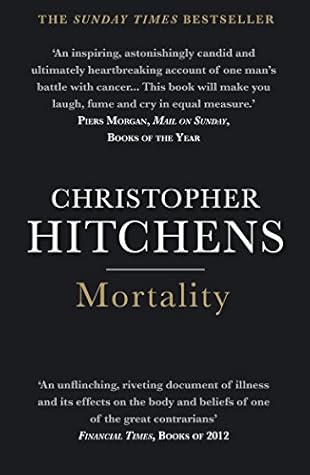More on this book
Community
Kindle Notes & Highlights
saucy fearlessness, in his great turbine of a mind,
stage theory of Elisabeth Kübler-Ross, whereby one progresses from denial to rage through bargaining to depression and the eventual bliss of “acceptance,”
To the dumb question “Why me?” the cosmos barely bothers to return the reply: Why not?
You feel swamped with passivity and impotence: dissolving in powerlessness like a sugar lump in water.
I sympathize afresh with the mighty Voltaire, who, when badgered on his deathbed and urged to renounce the devil, murmured that this was no time to be making enemies.
Put your faith in the almighty, he proposed, and you stand to gain everything. Decline the heavenly offer and you lose everything if the coin falls the other way. (Some philosophers also call this Pascal’s Gambit.)
Many readers are familiar with the spirit and the letter of the definition of “prayer,” as given by Ambrose Bierce in his Devil’s Dictionary. It runs like this, and is extremely easy to comprehend:
Prayer: A petition that the laws of nature be suspended in favor of the petitioner; himself confessedly unworthy.
The man who prays is the one who thinks that god has arranged matters all wrong, but who also thinks that he can instruct god how to put them right.
The tone of the prayers replicates the silliness of the mandate, in that god is enjoined or thanked to do what he was going to do anyway.
It’s no fun to appreciate to the full the truth of the materialist proposition that I don’t have a body, I am a body.
Cancer victimhood contains a permanent temptation to be self-centered and even solipsistic.
Deprivation of the ability to speak is more like an attack of impotence, or the amputation of part of the personality. To
attention for long: I can’t keep it up and anyway can’t stand to. When you fall ill, people send you CDs. Very often, in my experience, these are by Leonard Cohen. So I have recently learned a song, entitled “If It Be Your Will.” It’s a tiny bit saccharine, but it’s beautifully rendered and it opens like this:
For me, to remember friendship is to recall those conversations that it seemed a sin to break off: the ones that made the sacrifice of the following day a trivial one. That was
I don’t have a body, I am a body. Yet
Amazing how heart and lungs and liver have held up: would have been healthier if I’d been more sickly.
those who say I am being punished are saying that god can’t think of anything more vengeful
than cancer for a heavy smoker.
Diamond had to die; and he duly, correctly (in narrative terms) did. Though—how can I put this?—a stern literary critic might complain that his story lacked compactness toward the end …
I’m not fighting or battling cancer—it’s fighting me.
If I convert it’s because it’s better that a believer dies than that an atheist does.
Alan Lightman’s intricate 1993 novel Einstein’s Dreams; set in Berne in 1905: With infinite life comes an infinite list of relatives. Grandparents never die, nor do great-grandparents, great-aunts … and so on, back through the generations, all alive and offering advice. Sons never escape from the shadows of their fathers. Nor do daughters of their mothers. No one ever comes into his own … Such is the cost of immortality. No person is whole. No person is free.
“How good it is to be us,” he
insisted ferociously on living, and his constitution, physical and philosophical, did all it could to stay alive.
His will to keep his existence intact, to remain engaged with his preternatural intensity, was spectacular.


